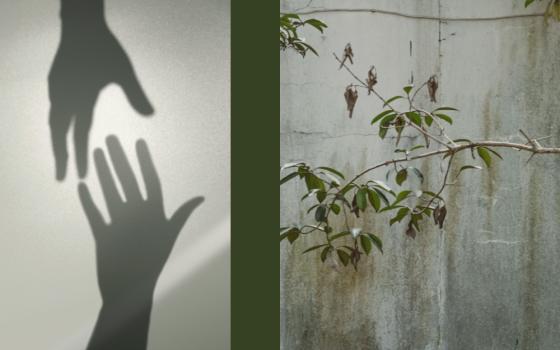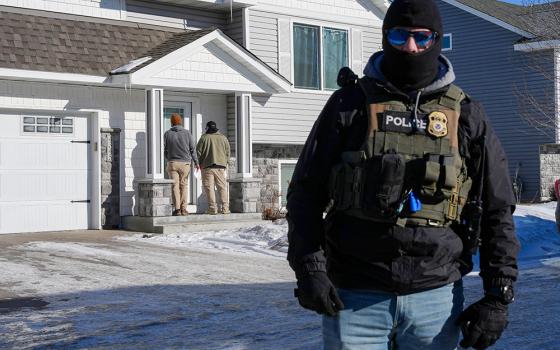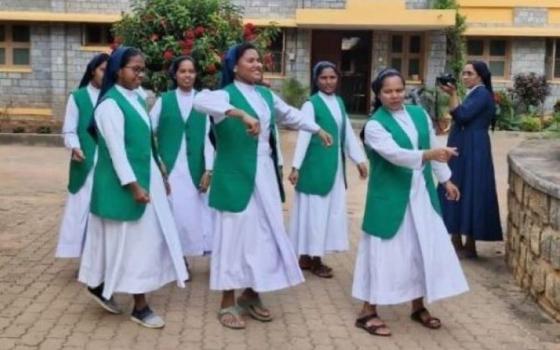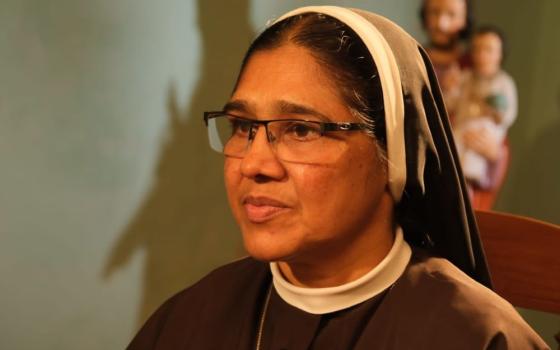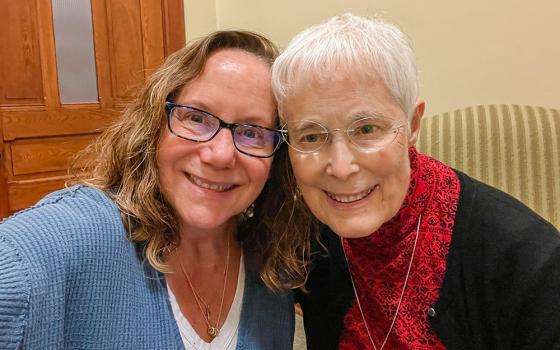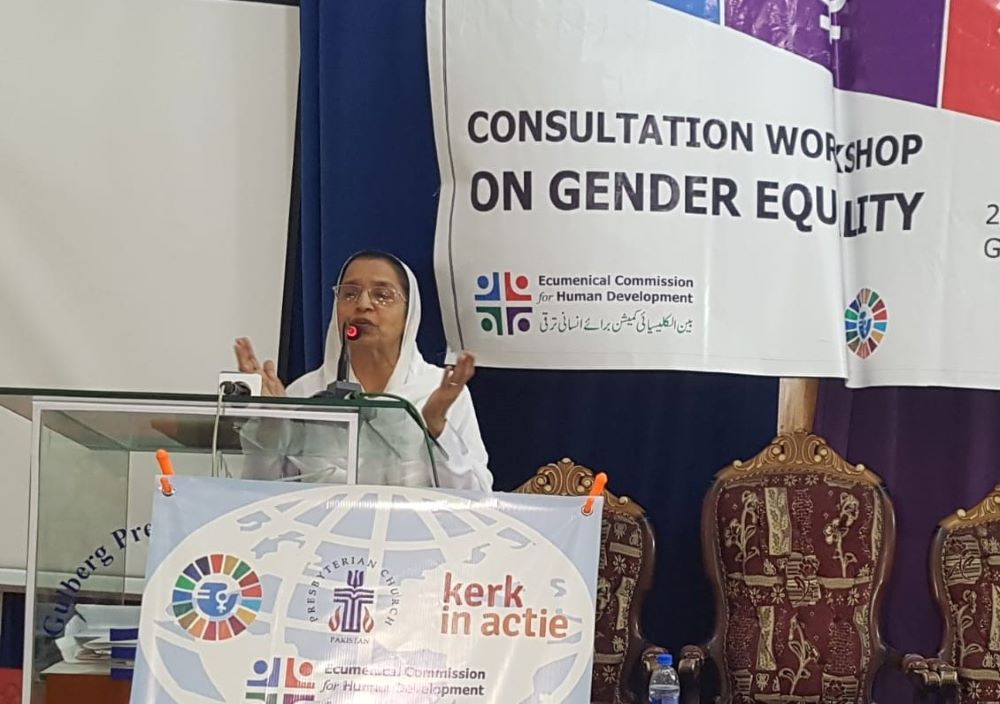
Sr. Genevieve Ram Lal speaks about gender equality at a Presbyterian Church in Lahore, Pakistan, on May 20. She has been the national director of the Catholic Women's Organization since 2012. (GSR photo/Kamran Chaudhry)
Pakistani Sr. Genevieve Ram Lal, a member of the Congregation of the Sisters of Charity of Jesus and Mary, became the national director of the Catholic Women's Organization in 2012.
The 65-year-old activist helps and guides women against being exploited or misused by their families or their acquaintances by providing counseling and reconciliation. She works with church and professional counselors to handle the conflict and post-conflict situations.
Her team empowers women through awareness raising and capacity building; to play an active role in the struggle for women's rights and to build a culture of gender equality and human dignity at the grassroots level in six dioceses of the Muslim-majority country.
Church groups accuse religious institutions of failing to investigate the increasing cases of abduction, forced marriages and forced conversions of minority females.
With the support of Missio Aachen, the Pontifical Missionary Society of Germany, Catholic Women's Organization provides legal aid for cases of domestic violence, forced conversions and forced marriages, kidnappings, separation between couples, divorce, child custody, and theft in the cases of domestic servants.
The "family," as Ram Lal calls her organization, has reached out to 8,228 individuals last year through 12 human rights education workshops, 13 faith formation sessions, 13 health sessions and other activities.
According to Lahore- based Center for Social Justice, 39 cases of forced conversions were reported between January and May 10, 2023. Eighteen of the converted were below 18 years of age, and eight below age 14. Two were over 18. The ages of 11 victims were not reported or were concealed; they likely were minors.
At least 124 incidents during 2022 were reported, which included 81 Hindu, 42 Christian and one Sikh. Among 78 girls in 2021, 76% were below 18 , and the age of 18% was not mentioned. The reported cases in the year 2022 increased by 59% from the previous year.
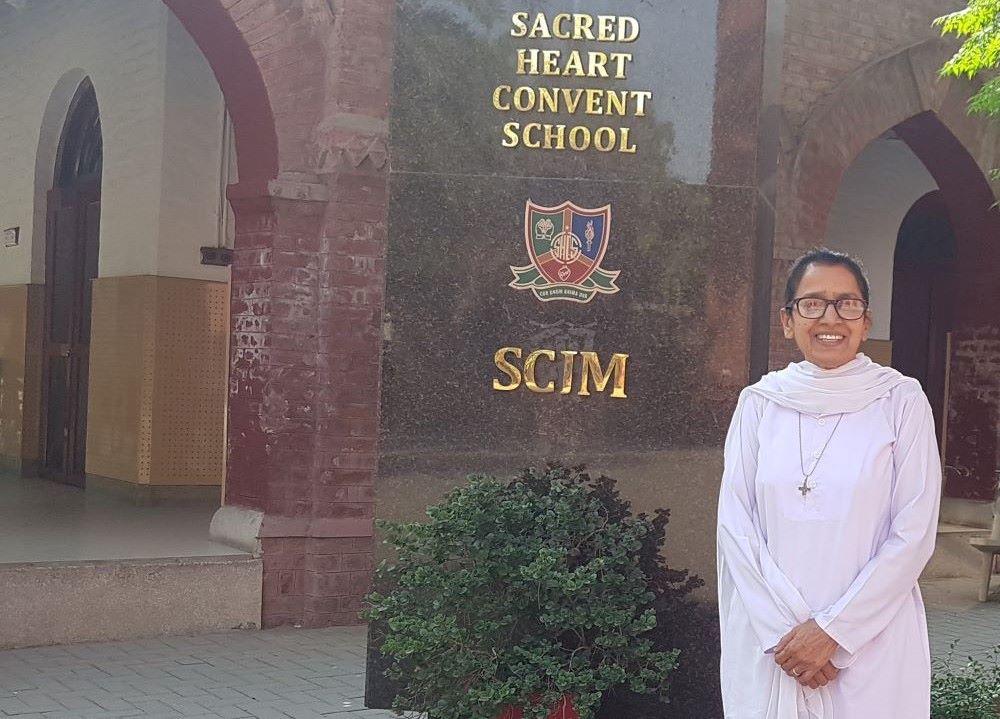
Sr. Genevieve Ram Lal speaks at Sacred Heart Convent School in Lahore, Pakistan on May 15. (GSR photo/Kamran Chaudhry)
GSR: Tell us about the challenges of Christian women in Pakistan.
Ram Lal: Women are the marginalized segment of patriarchal society of Pakistan. Being a minority woman is being double jeopardized and being a poor minority woman adds another layer of persecution.
Christian women are continually becoming victims of violence, with physical and verbal offenses, psychological and sexual abuse, rape (including marital rape), assaults, forced conversions, and forced marriages. They are vulnerable in the health sector and education.
Sadly the institutions and departments responsible for providing justice are not gender sensitized in our country. Since corruption is on the rise, it becomes difficult for women to even report the cases, and if the cases are registered, then women again have to face unequal and prejudiced treatment.
Christian women working as domestic workers bring along their daughters, fearing leaving them alone in the house. Unfortunately these girls are often victimized, blamed as thieves, raped and abused in the houses of the rich people.
Catholic women are far behind other denominations in terms of awareness and education. Christian women of other churches are easy to be grouped. Catholic women find it hard to step out of their homes and demand travel charges to attend seminars.
Pope Francis' famed apostolic exhortation Amoris Laetitia stresses the church's pastoral and spiritual care for marriage and family life and guides our work with families.
What are the challenges you face in leading the Catholic Women's Organization?
There is more fatalism in women belonging to religious minorities who prefer avoiding speaking of their rights. What good will fighting do, they say. We are trying to convince them to stand up for a better society and educate the next generation. Our hope for change and transformation lies in youth.
The situation of faith among Christian women is another challenge. We are working to introduce the person of Christ to them and strengthen their shallow faith. They believe in Jesus but don't experience Him on a personal level.
Thus depression and hopelessness is prevailing among the Christian living in bastis (small slum areas). It has resulted in problems of prostitution and alcoholism in Christian settlements where most young girls are breadwinners, working as nurses or as beauticians while men are mostly jobless or drug addicts.
Please share your experience of running a school in an Islamic country and how it promotes interfaith harmony.
Church-run schools are the best venue to bring interfaith harmony. Rendering this service to humanity brings understanding and appreciation about the other religions through parents, students and teachers.
Elite missionary schools are popular in the country for their discipline and higher learning.
Both former president Asif Ali Zardari and former prime minister Nawaz Sharif are alumni of Catholic schools in Karachi and Lahore, respectively. Sharif's daughter, Maryam Nawaz, is the last high-profile politician who studied in a missionary school as the competition grows. The increasing competition from private schools has left church-run schools to advertise admissions on their boundary to attract students.
Advertisement
Such schools have more Muslim students. Thus there is a good chance to defeat the discriminatory mindset and plan the values to bring reconciliation.
Quality education is important for sociocultural and spiritual transformation which is needed in our country. Sessions with students on gender equality challenge the boys to become helpers and work together to bring equality.
Working as a principal of Catholic schools in Lahore Diocese and Rawalpindi, neighboring the Islamabad capital, for about two decades was a chance for me to (educate) the minority students and make them confident and appreciative of not only other religions but also other denominations.
Can you share your views about the low literacy rate among Christians despite missionaries pioneering schools and many church-run schools in Pakistan?
Christians pioneered modern education in the subcontinent. In 1849, two Presbyterian missionaries established Rang Mahal School, the first English school in this region. The congregations had a mission and vision to educate the people of Pakistan.
However only 34% of religious minorities, including Christians, are literate and just about 4% of them go for university education.
Christians still compare local church leaders with missionaries who used to support the communities with foreign funds. As the aid from abroad dries up, Catholic families still want free education for their children amid a sinking economy and I am against that. We don't want to produce beggars. Free education is taken for granted.
Despite full scholarships by the Sant'Egidio Community, only two girls and one boy were able to progress to college (grade 11) under the "Hope for Future" project in Rawalpindi last year. Boys from Christian bastis are more inclined to drugs and other social evils after grade 5. Thus matchmaking problems arise for highly educated girls.
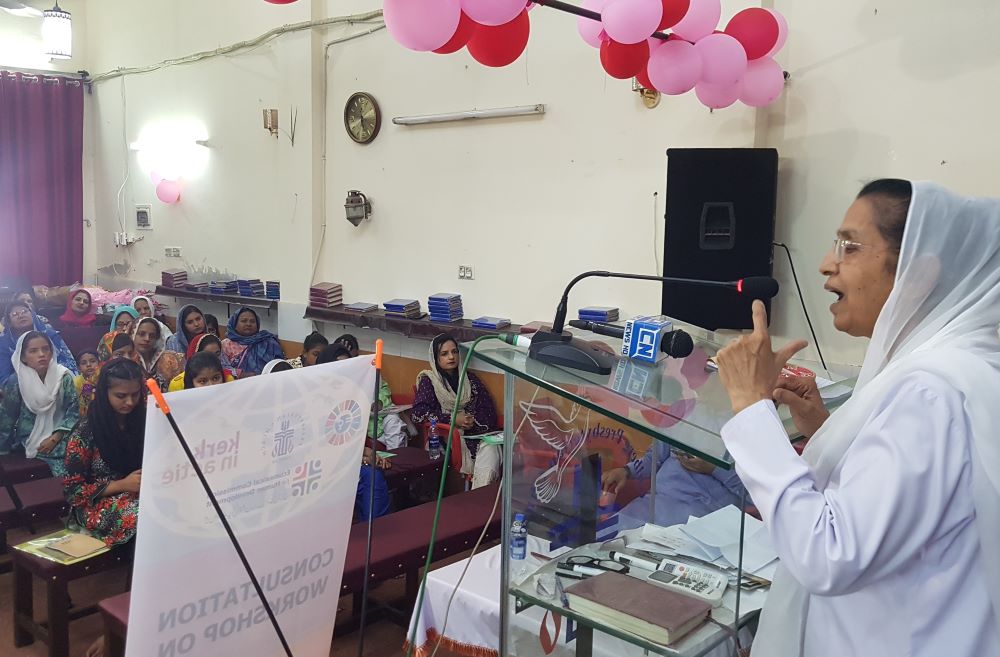
Sr. Genevieve Ram Lal speaks about gender equality at a Presbyterian church in Lahore, Pakistan, on May 20. (GSR photo/Kamran Chaudhry)
Kindly share your concerns with the syllabus often criticized for being biased and insensitive to religious minorities.
The Catholic Church, which operates 448 education institutes, has often criticized the syllabus for praising only Islamic personalities while presenting followers of other religions as infidels and depicting Christianity negatively, thus hurting our faith and sentiments. Textbooks have excessive Islamic content, even science books.
As the only educational institutions that provide catechism classes, the majority of Christian parents favor church-run schools. Non-Muslim children have the option of taking ethics and moral studies from third grade onwards.
In 2007, the Ikhlakiyat (ethics) syllabus was introduced in the National Curriculum for non-Muslim students as an alternative to the compulsory Islamiyat (Islamic study). The majority of government-run schools were given no choice and adopted a slow process of incorporating ethics. Non-Muslims preferred to take Islamiyat, fearing low marks in the annual examinations.
In 2021, the former prime minister, Imran Khan, introduced the Single National Curriculum as a uniform education system across the nation. The Federal Ministry of Education introduced seven minority religions (Baha'i, Buddhism, Christianity, Hinduism, Kalasha, Sikhism, Zoroastrianism) until grade five in the subject of religious studies, thus giving us some freedom.
Christian educationalists and groups including the Catholic bishops' National Commission for Justice and Peace did a lot of work to highlight the material in the school syllabus. The new curriculum is better than the previous one after removal of derogatory material, but now there is more Islamic content.
Despite the addition of religious studies, the bishops say they won't stop giving catechism in schools managed under the diocesan board of education. It is the base of Catholicism.

